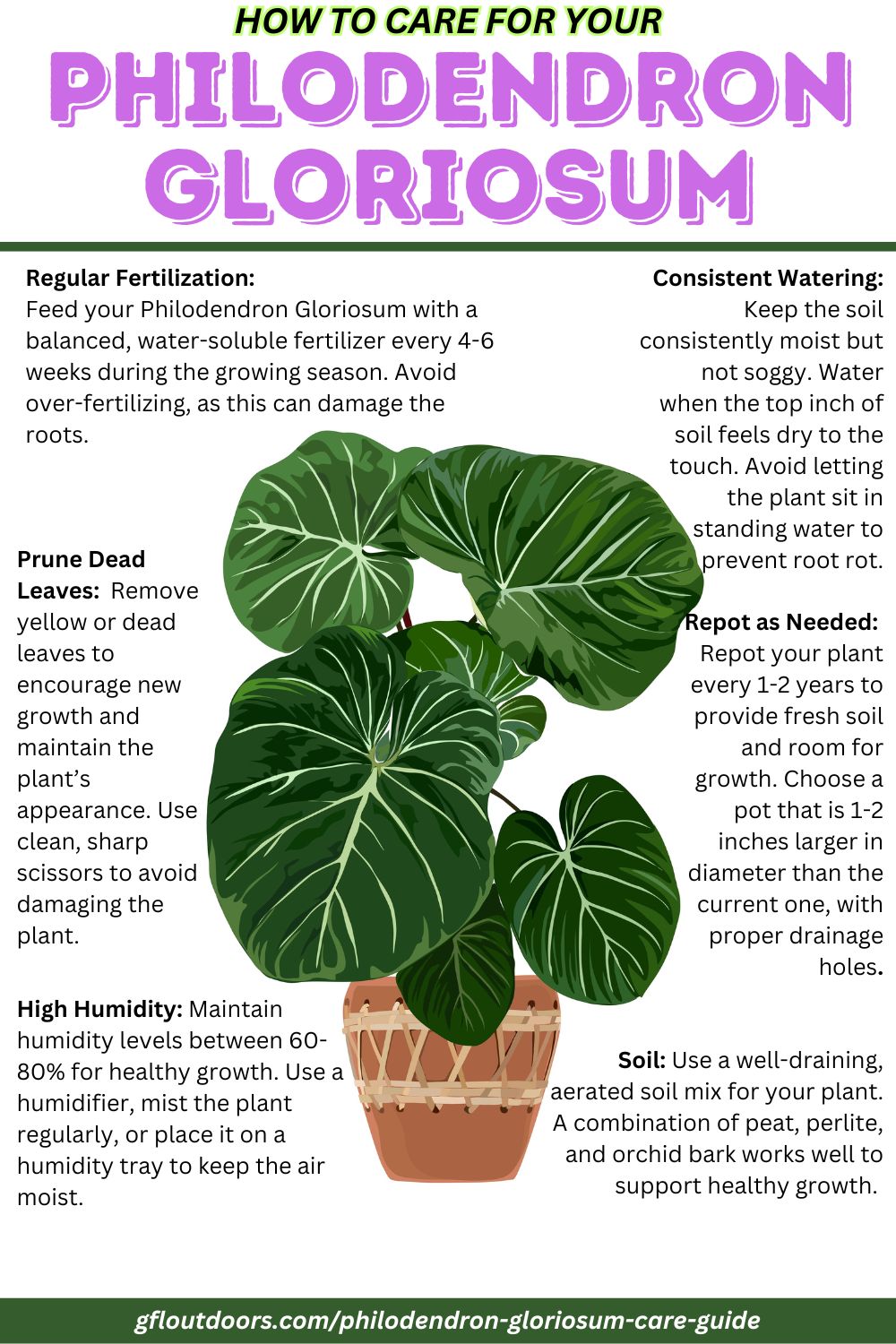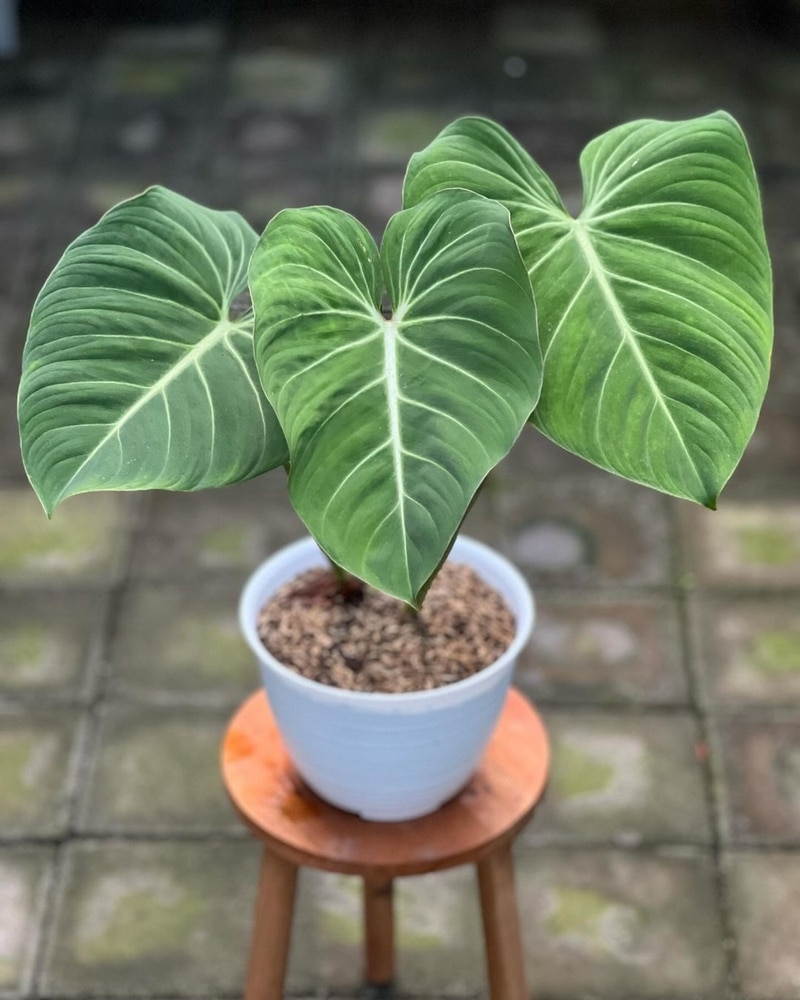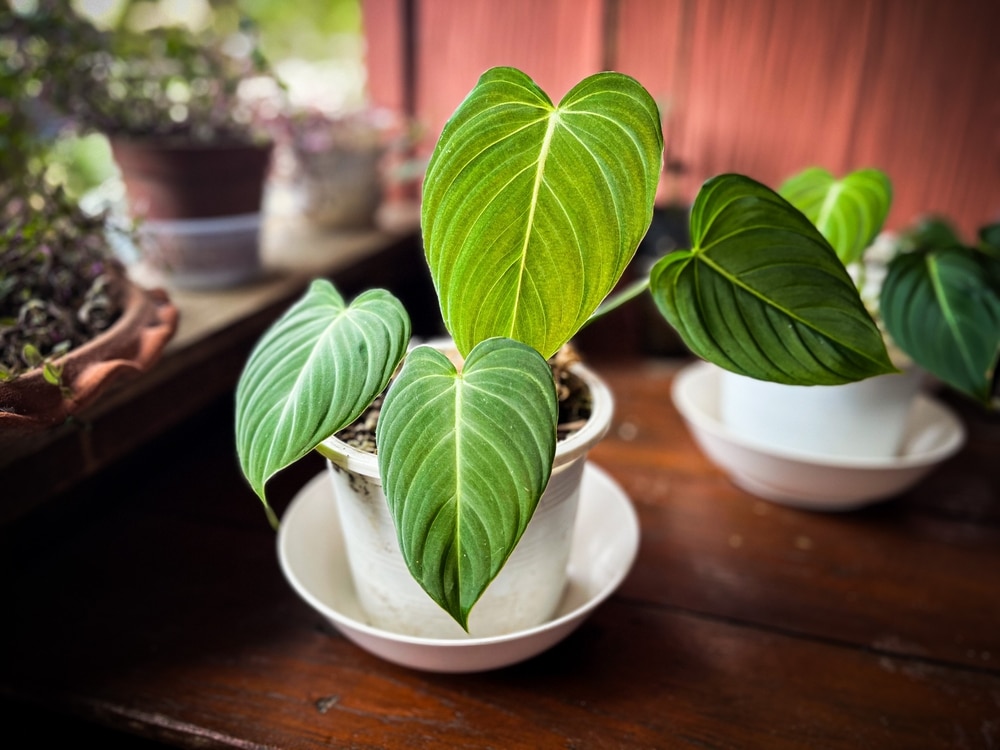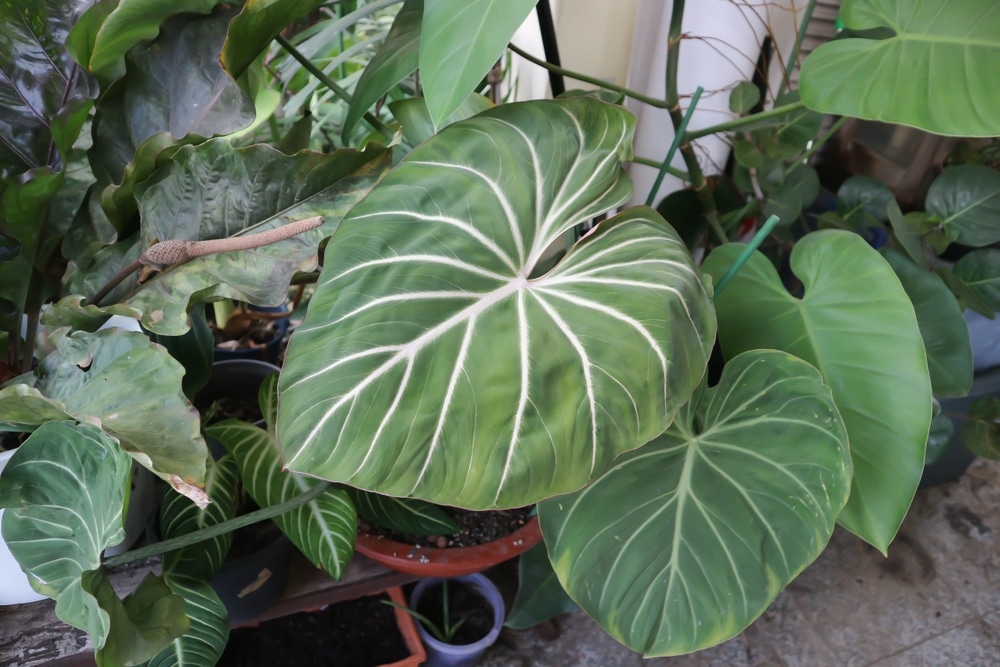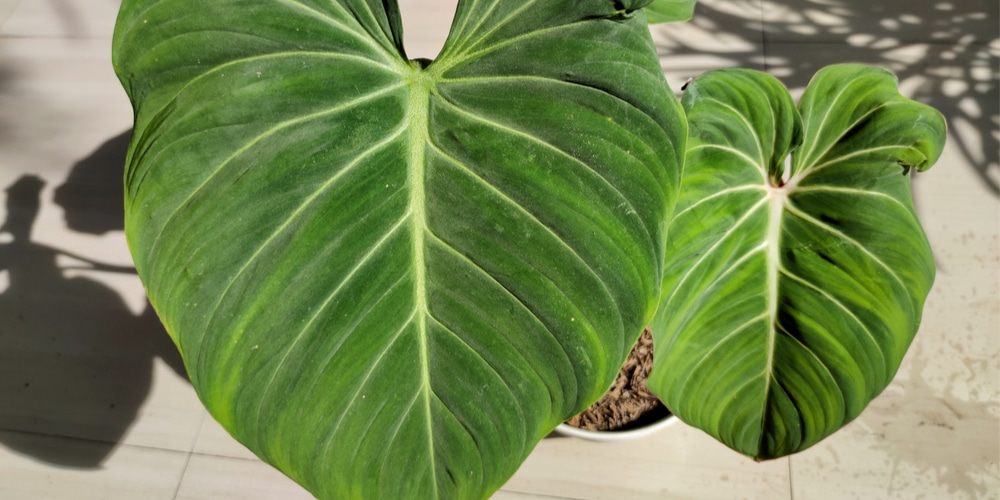Philodendron Gloriosum: Getting Started
Philodendron Gloriosum is both stunning and easy to care for. Learn about its intriguing origins and unique features that make it a captivating addition to your houseplant collection.
Origin and Background
Philodendron Gloriosum hails from the tropical regions of Colombia. It belongs to the Araceae family, a group known for its hardy, adaptable plants.
This species’ natural habitat includes shaded forest floors, where it thrives in high humidity and indirect light. It crawls horizontally via a rhizome, a thick rootstock from which its leaves emerge.
First described scientifically in the 19th century, the plant quickly gained popularity among houseplant enthusiasts. Its striking foliage and ease of care made it a favorite. Unlike some tropical plants, it adapts well to indoor conditions, provided its basic needs are met.
Distinctive Features
Philodendron Gloriosum stands out with its large, heart-shaped leaves that can grow up to 36 inches long. These leaves feature velvety textures and prominent white or pink veins, offering a striking visual contrast.
The plant’s creeping rhizome is another notable characteristic. Unlike upright-growing cousins, this philodendron spreads horizontally. This growth habit is crucial when planting, requiring a shallow but wide pot to accommodate its sprawl.
You’ll also appreciate its comparatively low maintenance. It thrives in indirect light and well-draining soil. Regular watering, allowing the soil to dry out partially, will keep it flourishing. It doesn’t ask for much, just the right balance of light, water, and space to grow horizontally.
Setting Up the Stage: Choosing the Right Spot
Picking the ideal location for your Philodendron Gloriosum is essential for its health and growth. Follow these guidelines to make sure your plant thrives:
- Light:
- Keep the plant in bright, indirect light. Direct sunlight can scorch its beautiful leaves.
- A spot near a north or east-facing window is usually best.
- Temperature:
- Philodendron Gloriosum enjoys mild temperatures. Maintain room temperatures between 65°F and 85°F (18°C – 29°C).
- Avoid placing it near cold drafts or heating vents.
- Humidity:
- These plants love humidity. Aim for around 60% to 80% humidity.
- A humidifier or frequent misting can help maintain the required moisture levels.
- Air Circulation:
- Good air circulation is important, but avoid placing the plant directly in the path of fans or air conditioners.
- Pot and Soil:
- Use a well-draining potting mix. A combination of peat, perlite, and orchid bark works well.
- Make sure the pot has drainage holes to prevent root rot.
Quick Tips:
- Avoid direct sunlight to prevent leaf burn.
- Maintain consistent humidity to keep those lush, velvety leaves vibrant.
- Rotate the pot regularly to ensure even growth.
Positioning your Philodendron Gloriosum correctly ensures it remains a striking and healthy addition to your indoor jungle. Keep these key factors in mind, and your plant will flourish beautifully!
Essential Care Tips
To keep your Philodendron gloriosum thriving, focus on proper watering, light, soil, fertilization, temperature, and humidity.
Watering Wonders
Watering your Philodendron gloriosum correctly is crucial for its health. Only water when the top half of the potting soil is dry. This tropical plant enjoys moist soil but does not tolerate soggy roots.
Overwatering can lead to root rot, while underwatering can cause wilting. Use lukewarm water and pour it evenly over the soil. Ensure proper drainage to avoid standing water in the pot.
A self-watering pot can be a helpful tool. Be mindful of seasonal changes; water more frequently in summer and reduce watering in winter.
Light Requirements
Philodendron gloriosum prefers bright, indirect light. Exposure to direct sunlight can scorch its leaves, while too little light may hamper growth. A spot near a north or east-facing window is ideal.
If natural light is limited, a grow light can supplement the plant’s needs. Avoid placing it in deep shade, as this can cause leggy growth and reduced leaf vibrancy.
Rotate the plant occasionally to ensure all sides receive equal light. This helps maintain its even, lush appearance.
Soil and Fertilization
This plant thrives in a well-draining, light potting mix. A mix of peat, perlite, and orchid bark works well. Sphagnum moss also helps retain moisture without waterlogging the roots.
Use a balanced liquid fertilizer every 4-6 weeks during the growing season (spring and summer). Ensure the fertilizer is diluted to half strength to avoid nutrient burn.
Repot the plant every 2-3 years to refresh the soil and accommodate its growing root system. Choose a slightly larger pot each time.
Temperature and Humidity Essentials
Philodendron gloriosum loves warm and humid environments. Keep daytime temperatures between 65°F and 85°F (18°C – 29°C). Nighttime temperatures should not dip below 60°F (16°C).
To enhance humidity, mist the leaves regularly or place a humidifier nearby. Grouping plants together or using a humidity tray filled with water and pebbles can also help.
Avoid placing the plant near drafty windows or heating vents, as sudden temperature changes can stress it. Consistent warmth and humidity will keep your Philodendron thriving and looking lush.
Growing Pains: Common Issues
Philodendron Gloriosum, while beautiful and rewarding, comes with its own set of challenges. From pests that nibble on its delicious leaves to diseases that cause it to droop, here’s what you need to watch out for.
Pest Problems
Pests can be a persistent issue for your Philodendron Gloriosum. Common culprits include spider mites, aphids, and mealybugs.
- Spider Mites: These tiny pests are almost invisible to the naked eye, but their presence is often indicated by webbing on the undersides of leaves. Regularly spraying water or using neem oil can help keep them at bay.
- Aphids: Small, green, or black bugs that cluster on new growth. You can remove them by wiping the leaves with soapy water or insecticidal soap.
- Mealybugs: White, cotton-like masses on your plant. They often hide in leaf joints. Dabbing them with alcohol-soaked cotton swabs is an effective method to get rid of them.
Regularly inspect your plant and maintain good air circulation to minimize pest problems. If an infestation occurs, going for organic pest control methods is usually effective and safer for your plant.
Disease Dilemmas
Diseases can strike even the most well-cared-for Philodendron Gloriosum. The main diseases to watch out for are fungal infections and root rot.
- Fungal Infections: Often caused by overwatering or poor air circulation, look for yellowing leaves or black spots. Ensure your plant is in a well-draining potting mix and avoid overhead watering.
- Root Rot: This is a killer and often a result of an overly wet environment. Ensure that the top half of the soil dries out before the next watering. Signs include wilting leaves and mushy roots.
- Bacterial Blight: This disease causes dark, water-soaked spots on leaves. Isolate the affected plant and remove the infected parts. Using a copper-based fungicide can help contain the spread.
Keeping your plant healthy involves a combination of proper watering, suitable lighting, and good ventilation. Regularly check for any signs of trouble and act promptly to prevent diseases from spreading.
Propagation Station: Multiplying Your Gloriosum
Ready to multiply your Philodendron gloriosum? Here’s how to do it:
First, get a 4-6 inch stem cutting from the mother plant. Ensure it has at least two leaves and cut just below a node.
Next, remove the bottom leaves from the stem, leaving only 2-3 leaves at the top.
Let the Cutting Callous
- Allow the cut end to callous over for a few hours. This helps prevent rot.
- Patience is key!
Planting Time
- Prepare a pot with moist sphagnum moss or well-draining soil.
- Insert the calloused end into the moss/soil.
- Cover the pot with a plastic bag to retain moisture and humidity.
Light and Temperature
- Place your pot in bright, indirect light.
- Avoid direct sunlight to prevent scorching.
Water Wisely
- Keep the moss/soil moist, but not soggy.
- Check moisture levels regularly.
Root Development
- Wait 2-4 weeks for roots to establish.
- Once roots are visible, you can transplant to a larger pot if needed.
Quick Tips:
- Maintain humidity by occasionally misting the plant.
- Ideal temperatures for growth are between 75°F and 85°F.
Now you’re all set to grow more beautiful Philodendron gloriosum! For more details, check out this handy guide. Enjoy propagating!
Seasonal Care Adjustments
Whether facing the chill of winter or the warmth of summer, your Philodendron gloriosum has specific needs. Knowing how to adjust your care routines ensures this tropical beauty thrives year-round.
Winter Care
Winter can be tough on many houseplants, and the Philodendron gloriosum is no exception. During colder months, temperatures can drop below the ideal range of 65°F to 85°F (18°C to 29°C) for prolonged periods. This can stress your plant.
- Temperature: Nighttime temperatures should be between 60°F-70°F (16°C-21°C). If temperatures are expected to dip, consider using a space heater or moving your plant to a warmer room.
- Humidity: Indoor air can become dry in winter. Use a humidifier or place a tray of water near your plant to maintain humidity levels.
- Light: Shorter days mean less natural light. Consider using grow lights to supplement your plant’s light needs.
- Watering: Reduce watering frequency. The soil should be allowed to dry out slightly more than in summer to prevent root rot.
These steps will help your Philodendron gloriosum endure the cold months.
Summer Success Tips
When the heat is on, your Philodendron gloriosum will usually thrive, provided it’s not exposed to extreme conditions. Summer brings longer days and potentially more direct sunlight, which requires adjustments.
- Shade: Ensure the plant receives bright but indirect light. Direct sunlight can scorch its leaves.
- Watering: Increase the frequency of watering. Ensure the top half of the soil feels dry before watering again.
- Temperature: The ideal temperature remains between 75°F and 85°F (23°C to 29°C). Avoid placing it in overly hot locations to prevent heat stress.
- Ventilation: Good airflow is essential during hot months to prevent fungal diseases. An oscillating fan can help improve air circulation.
By taking these steps, your Philodendron gloriosum will flourish throughout the warmer months.
Frequently Asked Questions
Philodendron gloriosum is a stunning and hardy plant with specific care requirements for optimal growth. Here, we’ll cover how to water, light, pot, and propagate your plant effectively and keep it happy indoors.
How should I water my Philodendron gloriosum for optimal growth?
Water your Philodendron gloriosum when the top inch of soil feels dry.
It’s best to maintain moderate moisture levels without soaking the soil completely. Overwatering can lead to root rot, so ensure proper drainage.
What type of lighting conditions are ideal for a thriving Philodendron gloriosum?
Philodendron gloriosum flourishes in medium, indirect light.
Keep it away from direct sunlight, which can scorch the leaves. A bright room with filtered light is perfect for this tropical beauty.
Can you describe the ideal soil mixture for potting Philodendron gloriosum?
Use a soil mix that offers good drainage and aeration.
An ideal mix includes:
- Peat moss
- Perlite
- Orchid bark
This combination ensures moisture retention while preventing waterlogging.
What steps are involved in propagating Philodendron gloriosum successfully?
To propagate, follow these steps:
- Select a healthy stem with a few leaves and nodes.
- Cut below a node with a clean, sharp knife.
- Place the cutting in water or a mix of peat and perlite.
- Keep it in a warm, humid spot until roots develop.
What’s the trick to keeping Philodendron gloriosum happy indoors?
Maintain high humidity levels around your plant.
Misting the leaves regularly or placing a humidifier nearby helps. Also, keep temperatures consistent, ideally between 65-80°F.
Does a Philodendron gloriosum need a support structure, like a moss pole?
Unlike some climbing philodendrons, Philodendron gloriosum is a creeper.
It doesn’t require a moss pole; instead, it tends to grow horizontally. Provide a wide pot to accommodate its creeping nature.
Keep these tips in mind for a thriving Philodendron gloriosum.
Last update on 2025-03-31 / Affiliate links / Images from Amazon Product Advertising API
